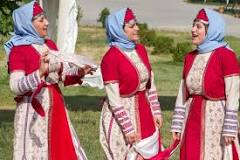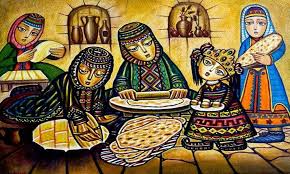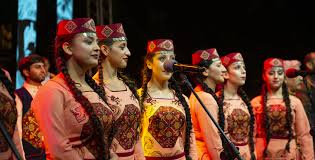Exploring the Timeless Charms of Armenian Traditions and Rituals

The Rich Tapestry of Armenian Traditions and Rituals
Armenia, a country steeped in history and culture, boasts a plethora of traditions and rituals that have been passed down through generations. These age-old practices not only reflect the values and beliefs of the Armenian people but also serve as a vibrant tapestry that weaves together the past, present, and future.
Weddings: A Celebration of Love and Unity
Armenian weddings are grand affairs filled with joy, music, and symbolism. One of the most cherished traditions is the “khosk-kap” ceremony, where the groom asks for the bride’s hand in marriage from her family. This ritual signifies respect for tradition and the coming together of two families.
Easter: A Time of Renewal and Rebirth
Easter holds special significance in Armenian culture as a time of spiritual reflection and renewal. The week leading up to Easter, known as Holy Week, is marked by various rituals such as lighting candles in churches and participating in processions that symbolize Jesus Christ’s journey to crucifixion.
Harvest Festivals: Honouring Nature’s Bounty
Armenians have a deep connection to the land, which is reflected in their harvest festivals. During events such as Vardavar, people gather to celebrate the abundance of nature by dousing each other with water—a symbolic act of purification and fertility.
Birthdays: A Time for Blessings and Well Wishes
Birthdays are joyous occasions in Armenian culture, often celebrated with feasts, music, and dancing. It is common for friends and family to offer blessings and well wishes to the birthday celebrant, reflecting a sense of community and love.
In conclusion, Armenian traditions and rituals play a vital role in preserving the country’s rich heritage and fostering a sense of unity among its people. From weddings to harvest festivals, these practices continue to be cherished and upheld as an integral part of Armenian identity.
Understanding Armenian Traditions: Etiquette, Values, Beliefs, and Cultural Practices
- What is the etiquette for Armenian guests?
- What are the values of Armenian culture?
- What are the beliefs of the Armenian people?
- What are the traditions of Armenia?
What is the etiquette for Armenian guests?
When it comes to Armenian traditions and rituals, understanding the etiquette for Armenian guests is essential for a harmonious and respectful interaction. Armenian guests are expected to show warmth and hospitality, often bringing gifts such as flowers or sweets when visiting someone’s home. It is customary to remove shoes upon entering a house, as a sign of respect for the host’s space. Additionally, guests are encouraged to engage in polite conversation, express gratitude for the hospitality shown, and participate in any traditional customs or rituals that may be observed during gatherings. By adhering to these etiquettes, guests can contribute to a positive and memorable experience while honouring Armenian cultural norms.
What are the values of Armenian culture?
Armenian culture is deeply rooted in a set of values that have shaped the identity of its people for centuries. Honour, respect, and hospitality are fundamental pillars of Armenian society, emphasising the importance of treating others with dignity and kindness. Family bonds hold great significance, with strong ties between relatives forming the foundation of Armenian communities. Additionally, a profound reverence for tradition and history is evident in various rituals and customs that are upheld with pride and reverence. Overall, the values of Armenian culture reflect a deep sense of unity, resilience, and a profound connection to both the past and the present.
What are the beliefs of the Armenian people?
The beliefs of the Armenian people are deeply rooted in a combination of Christian faith, cultural heritage, and historical experiences. Christianity, particularly the Armenian Apostolic Church, holds a central place in Armenian identity, shaping many aspects of daily life and traditions. Armenians also hold strong reverence for family values, community bonds, and respect for elders. Additionally, a profound connection to the land and nature is reflected in various rituals and festivals that honour the bounty of the earth. Overall, the beliefs of the Armenian people encompass a rich tapestry of spiritual devotion, cultural pride, and a sense of unity that have been cherished for centuries.
What are the traditions of Armenia?
Armenia is steeped in a rich tapestry of traditions that have been cherished for centuries. From vibrant wedding ceremonies filled with music and symbolism to solemn Easter rituals that symbolize renewal and rebirth, Armenian traditions are diverse and deeply rooted in the country’s cultural heritage. Harvest festivals honouring nature’s bounty, birthday celebrations filled with blessings and well wishes, and various other customs showcase the strong sense of community and connection to the land that define Armenian culture. These traditions serve as a testament to the values, beliefs, and resilience of the Armenian people, reflecting a deep reverence for tradition and a celebration of life’s milestones.


